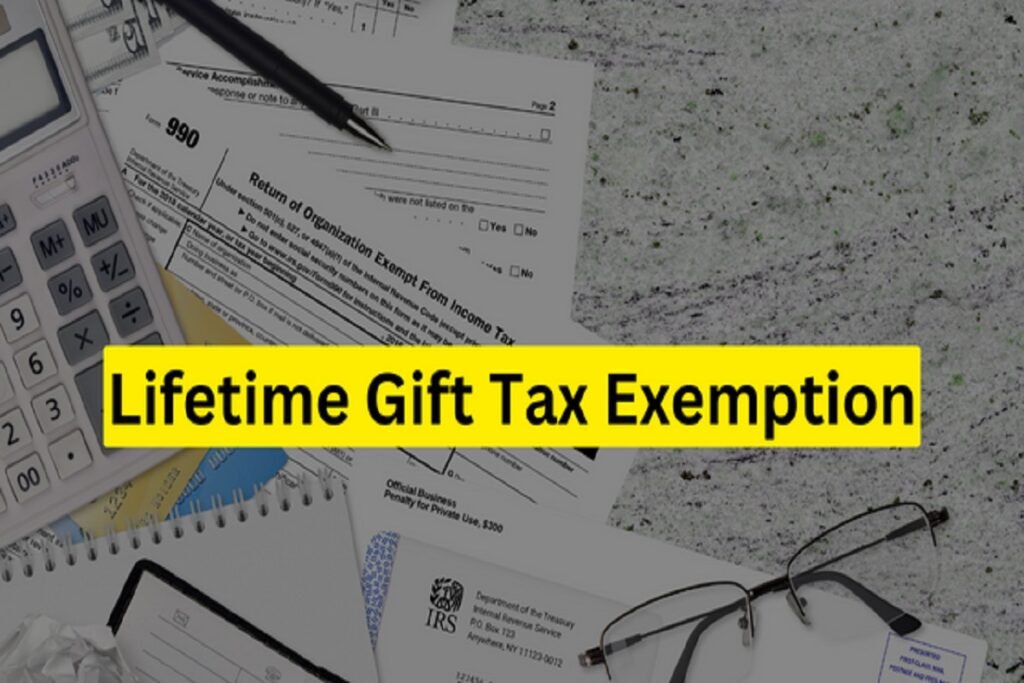Lifetime Gift Tax Exemption 2023: All you need to know about it is here!
Lifetime Gift Tax Exemption 2023: All you need to know about it is here!

If an individual chooses to present a non-spouse or non-dependent with money or property, they might be subjected to what is known as gift tax. This federal levy starts at 18% for specific gift sums and can escalate to as much as 40%. Notably, presenting gifts that surpass the $17,000 annual limit in 2023 does not instantly make them liable for the gift tax. Furthermore, the Internal Revenue Service permits an individual to provide up to $12.92 million worth of assets or property in their lifetime and/or as part of their estate under the 2023 Lifetime Gift Tax Exemption.
Lifetime Gift Tax Exemption 2023
Gift tax, a governmental duty, is levied when an individual gifts property or money to another without receiving anything of equal or greater value in return. Despite appearing burdensome, due to several significant IRS regulations, most Americans will not owe any gift taxes. If a gift exceeds the annual exclusion limit, no taxes are demanded as the excess simply gets deducted from the recipient’s 2023 Lifetime Gift Tax Exemption limit.
Consider this scenario for the tax year 2023: A mother decides to gift her granddaughter a $30,000 car as a graduation present. Technically, the grandmother’s gifts would exceed the $17,000 yearly exclusion limit per gift by $13,000, but she isn’t obligated to pay any additional taxes. This is because she would report the gift using IRS Form 709, and deduct the $13,000 from her $12.92 million 2023 Lifetime Gift Tax Exemption. Therefore, she could continue to give away up to $12,079,000 tax-free.
How to Calculate the IRS Gift Tax?
Ascertain the gift’s fair market value.
Use the annual gift tax exclusion for the calculation ($17,000 per recipient for 2023).
To compute the taxable gift value, deduct the yearly exclusion from the gift’s value.
Combine the taxable gift for the current year with previous taxable gifts given.
Utilize the lifetime gift tax exemption for further calculations ($12.92 million per individual in 2023).
If the total taxable gifts surpass the lifetime exemption, calculate the gift tax, which ranges between 18% to 40%.
Submit a Form 709 to the IRS, even if there’s no gift tax owed.
To compute and provide guidance on this, seek assistance from tax professionals.
Lifetime Gift Tax Exemption 2023 Planning Tips
Get to know the 2023 lifetime gift tax exemption: $12.92 million per individual or $25.84 million for couples who are married.
Donate assets that have the potential to appreciate, to take full advantage of the exemption.
Utilize Family Limited Partnerships (FLPs) for the transfer and management of assets.
Consider Irrevocable Life Insurance Trusts (ILITs) to exclude life insurance proceeds from your estate.
Donate to qualifying charities to employ the lifetime gift tax exemption.
Look into trusts like Grantor Retained Annuity Trusts (GRATs) and Qualified Personal Residence Trusts (QPRTs) to maximize the exemption.
Seek advice from estate planning or tax professionals to craft a strategy that aligns with your specific needs.
What is the Tax-Free Gift Limit for 2023?
In 2023, the tax-free gift threshold, or gift tax exclusion, is $17,000, a rise from the $16,000 limit set for 2022. Consequently, for gifts up to $17,000 given to any number of recipients in 2023, you don’t have to concern yourself with the federal gift tax. Moreover, if you’re married, your spouse can also gift the same amount, $17,000, to the same beneficiaries. So, collectively in 2023, you and your spouse could present $34,000 to each beneficiary. By staying within the annual gift tax limit for each recipient, you may circumvent the need for gift tax returns.
What If You Exceed the Annual Gifting Limits?
In the absence of an exemption, if you gift more than $17,000 to someone in 2023, you are required to file a federal gift tax return using IRS Form 709. Despite this requirement, you may not necessarily have to pay any taxes. Furthermore, a lifetime gift tax exclusion exists that could protect your gifts from being taxed. Thanks to this substantial exemption amount, most individuals never end up paying any gift tax at all.
Increased Lifetime Gift Tax Limit in 2026
In 2026, the lifetime gift tax exclusion is set to be cut by half, bringing the maximum limit down to $6.8 million. There’s a chance that Congress might decide to keep the current exemption amount permanently, but it’s not guaranteed. Fortunately, according to IRS guidelines, you can apply either the lifetime gift tax exclusion that was in effect when the gifts were given or the exclusion amount that was in place when the donor passed away, whichever is greater. As a result, making significant gifts before 2026 does not carry the risk of losing the larger gift tax exclusion level if it gets reduced.
Note: All informations like net worths, obituary, web series release date, health & injury, relationship news & gaming or tech updates are collected using data drawn from public sources ( like social media platform , independent news agency ). When provided, we also incorporate private tips and feedback received from the celebrities ( if available ) or their representatives. While we work diligently to ensure that our article information and net worth numbers are as accurate as possible, unless otherwise indicated they are only estimates. We welcome all corrections and feedback using the button below.
Advertisement